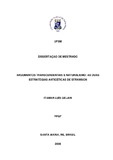| dc.creator | Gelain, Itamar Luís | |
| dc.date.accessioned | 2008-11-25 | |
| dc.date.available | 2008-11-25 | |
| dc.date.issued | 2008-08-15 | |
| dc.identifier.citation | GELAIN, Itamar Luís. Transcendental arguments and naturalism: the two antiskeptical strategies of Strawson. 2008. 113 f. Dissertação (Mestrado em Filosofia) - Universidade Federal de Santa Maria, Santa Maria, 2008. | por |
| dc.identifier.uri | http://repositorio.ufsm.br/handle/1/9051 | |
| dc.description.abstract | This dissertation has for objective to present and analyze the two anti-skeptical
strategies of Strawson, called transcendental arguments and naturalism.
Therefore, at a first moment, we will begin by distinguishing and characterizing the
two types of transcendental arguments - the refutative (elenctic) and the deductive
- which appear, respectively, in the two works Individuals and The bounds of
sense. At a second moment, only the refutative transcendental argument itself will
be analyzed, which is contained in the first work mentioned, and which is used by
Strawson to justify the belief of the continuous existence of the objects, the
objective of the skeptical question. And, at last, on one hand, will be discussed the
critics of Stroud against this anti-skeptical strategy, to know, the transcendental
arguments are not enough to face the skepticism, what makes Strawson to
abandon the transcendental arguments as anti-skeptical; and on the other hand,
naturalism is presented as the new anti-skeptical strategy of Strawson, which
would be supported by Hume and Wittgenstein, as well as the new role of the
transcendental arguments, taken now as conceptual connectors within the
conceptual scheme. | eng |
| dc.description.sponsorship | Coordenação de Aperfeiçoamento de Pessoal de Nível Superior | |
| dc.format | application/pdf | por |
| dc.language | por | por |
| dc.publisher | Universidade Federal de Santa Maria | por |
| dc.rights | Acesso Aberto | por |
| dc.subject | Strawson | por |
| dc.subject | Naturalismo | por |
| dc.subject | Metafísica | por |
| dc.title | Argumentos transcendentais e naturalismo: as duas
estratégias anticéticas de Strawson | por |
| dc.title.alternative | Transcendental arguments and naturalism: the two antiskeptical strategies of Strawson | eng |
| dc.type | Dissertação | por |
| dc.description.resumo | Esta dissertação tem por objetivo apresentar e analisar as duas estratégias
anticéticas de Strawson, denominadas de argumentos transcendentais e
naturalismo. Em virtude disto, parte-se, num primeiro momento, da distinção e
caracterização dos dois tipos de argumentos transcendentais o refutativo
(elêntico) e o dedutivo que figuram respectivamente nas obras Indivíduos e Os
Limites do Sentido. Num segundo momento, analisa-se tão somente o argumento
transcendental refutativo (elêntico) contido na primeira obra citada, o qual é
empregado por Strawson para justificar a crença na existência contínua dos
objetos, alvo do questionamento cético. E, por fim, se discute, por um lado, as
críticas que Stroud endereça a essa estratégia anticética, a saber, os argumentos
transcendentais não são suficientes para fazer frente ao ceticismo, o que implica
num abandono dos argumentos transcendentais como anticéticos por parte de
Strawson. E, por outro lado, apresenta-se o naturalismo como a nova estratégia
anticética strawsoniana, a qual estaria apoiada em Hume e Wittgenstein, bem
como o novo papel dos argumentos transcendentais, entendidos agora como
conectores conceituais no interior do esquema conceitual. | por |
| dc.contributor.advisor1 | Gallina, Albertinho Luiz | |
| dc.contributor.advisor1Lattes | http://lattes.cnpq.br/0750109262601371 | por |
| dc.contributor.referee1 | Rossatto, Noeli Dutra | |
| dc.contributor.referee1Lattes | http://lattes.cnpq.br/2947312243186882 | por |
| dc.contributor.referee2 | Sartori, Carlos Augusto | |
| dc.contributor.referee2Lattes | http://lattes.cnpq.br/6830220445412069 | por |
| dc.creator.Lattes | http://lattes.cnpq.br/0469357996327574 | por |
| dc.publisher.country | BR | por |
| dc.publisher.department | Filosofia | por |
| dc.publisher.initials | UFSM | por |
| dc.publisher.program | Programa de Pós-Graduação em Filosofia | por |
| dc.subject.cnpq | CNPQ::CIENCIAS HUMANAS::FILOSOFIA | por |


